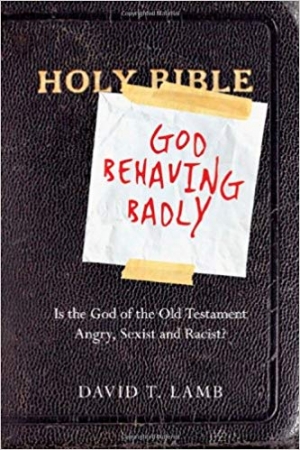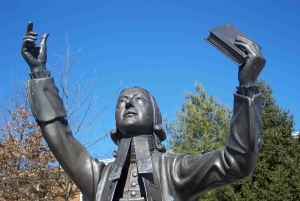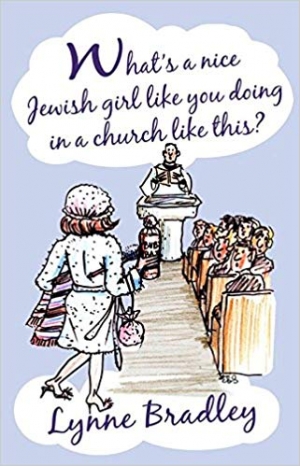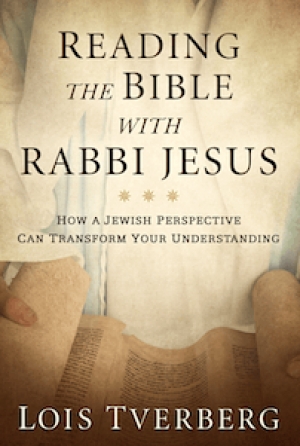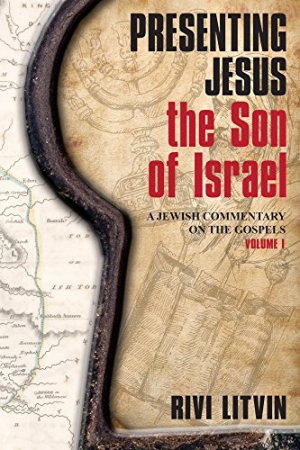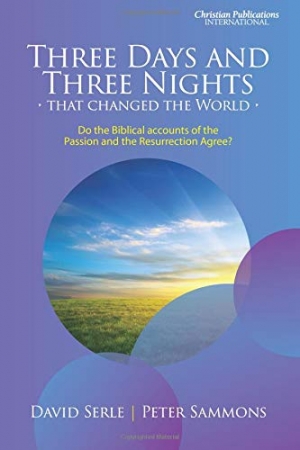General
Displaying items by tag: Jesus
Review: God Behaving Badly
Paul Luckraft reviews ‘God Behaving Badly’ by David T Lamb (2011, IVP)
This is an excellently-conceived and well-written book on an important theme, outlined in the subtitle: Is the God of the Old Testament angry, sexist and racist?
For Christians as well as non-Christians, this is a problem that has to be addressed. Certain parts of what we now call the ‘Old Testament’ seem to portray God in these terms, so how are we to settle this in our own minds and how should we respond to those who use this to attack our faith?
Combating Misconceptions
Lamb’s opening sentence is intriguing: “How does one reconcile the loving God of the Old Testament with the harsh God of the New Testament?” (p9). Read this too quickly and you’ll miss the point! The author often asks this question of his students and once they’ve realised he hasn’t misspoken a lively discussion usually ensues.
In the book, Lamb makes his initial point well. We are so fixated on the New Testament portraying a God of love that we forget how often the Old Testament shows him to be merciful, compassionate and slow to anger. We also forget how God’s angry side is still apparent once we cross the divide into the New.
Perhaps Lamb’s title should end with a question mark, just so that we are clear on the author’s intent. But we soon realise that he is very much wanting to clear God’s ‘bad reputation’ and set the record straight by examining as many biblical texts as possible across the diverse genres of Old Testament literature. His aims are to discuss many of the problematic passages in which God appears to ‘behave badly’ and combat the negative perceptions that arise from these.
Lamb sets out to clear God’s ‘bad reputation’, discussing many of the problematic passages in which God appears to ‘behave badly’ and combating the negative perceptions that arise from these.
Tackling Difficult Issues and Passages
Lamb tackles these issues one at a time, chapter by chapter. After three initial chapters on the topics of ‘angry’, ‘sexist’ and ‘racist’, he goes on to ask if God is violent or peaceful, legalistic or gracious, rigid or flexible, distant or near?
He places all of his discussions within historical context, for instance with reference to ancient Near Eastern texts, and also ends each chapter “looking at a relevant incident from the Gospels, showing how the particular characteristic of Yahweh is also manifested in the behaviour of Jesus” (p24).
As he goes, Lamb does not shy away from tackling difficult and controversial passages, such as the smiting of Uzzah dead simply for touching the Ark as the oxen pulling its cart stumbled. His explanation here is excellent – but you’ll have to read the book to discover it!
Safe Hands
The author writes in a way that convinces us that he has thought through every point he makes. Indeed, he has taught this often to his classes so the reader feels in safe hands. He employs occasional touches of humour where appropriate to lighten what could otherwise be a heavy and disheartening read.
Lamb mentions those who get round the ‘problem’ of God’s apparent bad behaviour by saying that those passages can be regarded as fictitious. Some today, like Marcion of old, say we can simply cut out those passages from our Bibles. Lamb’s counter-response is this:
While I find this conclusion attractive in one sense (the problem does disappear), I am unwilling to reject large sections of the Old Testament because the God it portrays doesn’t fit my perception of what he should be like. I continue to be troubled by Old Testament images of God, but I will work to understand them better by continuing to study the text on its own, within its biblical context and within its ancient Near Eastern context. (p102)
The author writes in a way that convinces us that he has thought through every point he makes.
Yesterday, Today and Forever
He ends the book with an epilogue summarising each of the eight chapters that have gone before. While all our questions may never fully be answered, he demonstrates that God is loving and gracious across the whole Bible, both as Yahweh in the Old and Jesus in the New. There is no discrepancy of character. Our God is fundamentally good, whichever part of the Bible we are reading.
After the epilogue comes a section of discussion questions, several for each chapter, making the book an excellent resource for study groups. There are also good endnotes, a sufficient bibliography to encourage further reading, and a very extensive Scripture index making it easy to look up any passage you might come across later in your Bible reading.
The author has tackled a difficult topic extremely well and his book is highly commended.
‘God Behaving Badly’ (205pp, paperback) is available from Amazon for £11.99 (paperback). Also in e-book form.
Birthday Celebrations
Sharing in the joy of Jesus, the Jews and John Wesley
As Israel celebrates another independence day, I look forward to a special birthday of my own in a few weeks.
Yes, the magic milestone reached last year by the modern Jewish state means I was conceived in Cape Town just a few months after Israel’s re-birth.
My own re-birth came nearly 23 years later – on 20 May 1972, at around 10:30pm. And I remember how this rather precise dating of my encounter with Christ proved of great fascination to Labour peer (and former deputy leader of the Party) Roy Hattersley.
Identifying with Wesley
We were showing South African friends around the small Lincolnshire town of Epworth, famous as home of the Wesleys and only 13 miles from where we live in Doncaster, when I noticed a familiar figure striding up towards me.
I immediately recognised him as he was often rolled into TV studios for political comment, but I also knew him from way back, when, as Fleet Street correspondent for the South African Press Association, I would often report on his Dispatch Box statements about Rhodesia (now Zimbabwe) or apartheid during his time as Foreign Office minister.
Although claiming to be atheist, Hattersley is a great admirer of Wesley, and of the Salvation Army founders for that matter, and has written biographies on both counts.
He was busy doing research for his Daily Mail column on why people like me made pilgrimages like this. I began by telling him that, though I was not a Methodist, I identified with Wesley in the sense that I had come into an experience of the risen Christ, just as he had done.
Though not a Methodist, I identify with Wesley in the sense that I have come into an experience of the risen Christ, just as he had done.
In fact, just as with the legendary preacher, I too could name the exact time and place where the change had taken place.
Furiously taking notes (as I used to do when he was speaking in Parliament), Lord Hattersley’s eyes grew wider with amazement. Like Wesley, I explained, I had felt my heart ‘strangely warmed’ as Jesus, at my invitation and at the prompting of another South African friend, came into my life in the north London home of my half-Jewish grandmother.
Great Awakening
Wesley’s re-birth took place on 24 May 1738 – also in London – after hearing an explanation of Luther’s introduction to a commentary on the Book of Romans. He was already a clergyman, as was his brother Charles, following in the footsteps of their father, who was rector of Epworth for some 40 years.
But now Wesley knew for sure that his sins were forgiven and that, by faith alone, he was accepted by Christ. The strange warming turned into a raging fire as he passionately proclaimed the Gospel for the next 50 years, riding a quarter-of-a-million miles on horseback in the process.
Historians are agreed that the subsequent awakening, also involving George Whitefield and others, averted a revolution of the kind that brought chaos to France.
My Own Testimony
 Running with perseverance: Charles Gardner completes a 10K cross-country ‘trail’ around Yorkshire’s famous Castle Howard estate in 2010. Photo: Linda Gardner
Running with perseverance: Charles Gardner completes a 10K cross-country ‘trail’ around Yorkshire’s famous Castle Howard estate in 2010. Photo: Linda Gardner
Although I can’t claim a Damascus Road encounter of the sort that caused the Apostle Paul to fall off his horse, my own conversion was preceded, just seven days earlier, by an experience in which I was stopped in my tracks during a marathon race in Scotland – on the road to North Berwick, as it happened.
At 22 miles, the same point in the 26.2-mile race that Paula Radcliffe came to an abrupt halt in the 2004 Olympics in Athens, I too ‘hit a wall’, so to speak. But the disappointment paved the way for my greater openness when my friend, Brian Jackson (an accomplished athlete), challenged me to follow Christ.
I have never looked back, and have become increasingly aware of our debt to the Jewish people, which is why, upon my retirement from full-time work in the newspaper industry, I began serving as a volunteer for the Church’s Ministry among Jewish people (CMJ).
Wesley passionately proclaimed the Gospel for 50 years, riding a quarter-of-a-million miles on horseback in the process.
I am also proud of my own Sephardic Jewish ancestry, and was especially helped in my early Christian life by a lovely Jewish lady called Helen Macintosh, who effectively became a spiritual mother to me.
Helen became a believer through Billy Graham’s 1954 meetings at Haringey in London and always afterwards described herself as a ‘completed Jew’. Like her, I long for the widespread spiritual restoration of the Jews promised in the scriptures (e.g. Zech 12:10; Rom 11:26) following their much-prophesied return to the Holy Land.
Beautiful Sound of the Gospel
To complete this season of birthdays, I will be heading for Epworth on Saturday 25 May at 2:30pm to watch a play on the Wesleys being performed by friends from Sheffield.
Oh that these islands would ring once again with the passion – in words and music – that awoke sleeping hamlets all over England to the beautiful sound of the Gospel!
Jewish Hopes Fulfilled
Paul Luckraft reviews ‘What’s a nice Jewish girl like you doing in a church like this?’ by Lynne Bradley (Instant Apostle, 2015).
Captives Released
Burqa-clad woman tells of her new-found freedom
Amidst all the unprecedented shaking of our troubled world, especially in the wake of the terrorist attacks on churches in Sri Lanka, it was wonderful to be reminded over Easter of the greatest truth of all – that Jesus is risen! Not only that, but he is also coming back in glory to judge the living and the dead.
We were attending a joyful Passover celebration with friends in a community hall near Sheffield when this truth was driven home afresh. It was explained that in Jewish tradition, when a guest who had left the table for some reason wished to indicate that he was coming back to finish off his meal, he would fold the napkin beside his plate.
In the same way, when the stone was rolled away on that first Easter morning, the burial cloth that had covered Jesus’ head (also translated ‘napkin’) was folded up by itself, separate from the rest of the grave-clothes (John 20:7), which was perhaps another way of saying: “I am coming back!”
Expressions of Freedom
The emphasis of the entire Passover feast was one of freedom, powerfully re-telling the message of how the Jews were freed from their slavery in Egypt through carrying out God’s instructions in daubing the blood of a sacrificial lamb on the doorposts of their houses.
All the guests had done the same – figuratively speaking – by marking the blood of Jesus, the ultimate Passover Lamb, on their hearts. The freedom from being enslaved by worldly passions felt by all of us was palpable, and was also expressed exuberantly through music and dancing.
Amidst the unprecedented shaking of our troubled world, it is wonderful to be reminded of the greatest truth of all: that Jesus is risen – and is coming back in glory!
Fear and Hatred
This is a freedom open to all who embrace what Christ has done for us on the Cross – including ‘A’ (name withheld for her protection) who caused quite a stir when she addressed an Israeli congregation in a black burqa with just a small opening for her eyes.
You could have heard a pin drop as she began to tell her story: “I was born and raised in a Muslim country. The word Yehudi [Jew] was instilled in me as a bad word, a cuss word. The Yehudi should not exist…they should be killed. I never thought to question why.1
“I was with my father on one occasion as a crowd gathered and we were pushed to the front. I saw a woman tied up, sitting on a box. A man pulled out a long sword and beheaded the woman. My legs were shaking, my heart beating fast, and my father said, ‘If you don’t listen to our teaching, this will happen to you one day.’
“I was a broken person. In my prayer time I lifted up my hands and cried out to Allah for help. ‘Please help my father stop beating my mother. Please help my father stop beating me.’ But no help came.
“Eventually our family went to America, and when my grandmother died of a heart attack, I was devastated. I lost my best friend. I was hurting so much only crying helped. A woman called Paula asked me if I was OK, and I started to cry. She put her arms around me and gave me a hug. Then she said, ‘Would you like to go to church with me?’
Love and Acceptance
“When I walked into this church I experienced love and acceptance from these people like I never had before. For the first time in my life I heard a message from the Bible. It was about Yeshua [Jesus], how he read from the scroll of the prophet Isaiah: ‘The Spirit of the Lord is upon me. He has anointed me to preach the gospel to the poor, to heal the broken-hearted, give sight to the blind, and to proclaim liberty to the captive.’
“It was the first time I heard words of freedom and healing. I was blinded with so much hatred in my heart and I was desperate to be freed. I knew the decision to leave Islam was a big one. But I was desperate to know a living God.
There is freedom available to all who embrace what Christ has done for us on the Cross.
“The day I gave my life to becoming a follower of Jesus I said, ‘God, forgive me. I did not know I hated your people.’” And taking off her burqa, she announced to the congregation: “Now I don’t need this anymore.”
She explained: “I love the Jewish people because it is their God and their Messiah I’m following and he told me to love them. This is the God of Abraham, Isaac and Jacob, and the nation of Israel is God’s heartbeat.
“I had never heard about the Holocaust, and now I meet with Holocaust survivors. I hear their stories and I share mine with them, saying: ‘Your Messiah changed my heart; he rescued me and brought joy in my life again. I’m a blessed woman.’”
The Golden Gate
 The sealed Golden Gate awaiting the triumphant return of the Messiah. Photo: Charles GardnerAnother reminder of the Messiah’s second coming is the Golden Gate, regarded as particularly sacred as it is said to be close to the site of the Holy of Holies of Solomon’s Temple, where the High Priest would sprinkle the blood of bulls and goats on the ‘Mercy Seat’ to atone for the sins of the people.2
The sealed Golden Gate awaiting the triumphant return of the Messiah. Photo: Charles GardnerAnother reminder of the Messiah’s second coming is the Golden Gate, regarded as particularly sacred as it is said to be close to the site of the Holy of Holies of Solomon’s Temple, where the High Priest would sprinkle the blood of bulls and goats on the ‘Mercy Seat’ to atone for the sins of the people.2
The gate was sealed shut in 1541 by Ottoman Sultan Suleiman the Magnificent to prevent the much-anticipated entry through this portal of the Jewish Messiah. And to make doubly sure it could never be fulfilled, the Turkish occupiers established a Muslim cemetery in front of the gate, knowing that a Jewish priest would not be able to pass through it.
Jesus is thought to have passed through this gate on Palm Sunday, when he came down from the Mount of Olives and entered the Temple (Luke 19:28-48). Once in the city, he said he would not be seen again until Jerusalem recognises him as Messiah (Matt 23:37-39).
According to Zechariah, his feet will one day touch the Mount of Olives, after which he will liberate the city from her slavery to sin and strife and bring lasting peace to both Arabs and Jews.
References
1 News & Views, newsletter of CMJ Israel. Testimony also available on YouTube courtesy of One for Israel.
2 Israel Today, April 2019.
Review: Reading the Bible with Rabbi Jesus
Paul Luckraft reviews ‘Reading the Bible with Rabbi Jesus’ by Lois Tverberg (Baker Books, 2017).
This book is the third in a worthy series on how understanding the Jewishness of Jesus can transform your faith. The previous two (Sitting at the Feet of Rabbi Jesus, Walking in the Dust of Rabbi Jesus) are equally commendable, as the author always puts across important information in an accessible manner.
This third volume, as its title suggests, is more about the Bible that Jesus had, showing us how he would have understood it. The contrast is clearly demonstrated between our Greek/Western understanding and the Hebraic approach that is so necessary if we are to unlock the treasures within God’s word.
Emmaus Road Experience
The author’s aim is to provide us with an experience akin to that of the disciples on the Emmaus Road (Luke 24) when Jesus explained what they were missing by not having a complete picture of their scriptures.
The book is divided into three main sections. Part One is called ‘Repacking our Mental Bags’ and is intended as a starter to help us begin our journey into the Bible as Jesus knew it. Part Two, ‘How the Bible Thinks’, guides us further along the path into Hebraic thinking and how the ‘big picture’ ideas contained within the Bible are essential to an understanding of its message. The third part is entitled ‘Reading about the Messiah’ and aims to show him through Hebrew eyes.
Tverberg contrasts our Greek/Western understanding with the Hebraic approach that is so necessary to unlock the treasures within God’s word.
Although these are useful divisions there is no reason why the book cannot simply be enjoyed chapter by chapter and dipped into according to time available and the desire to learn certain aspects more thoroughly than others.
Going Deeper
Each chapter ends with ‘Tools and Reflections’ and ‘Thoughts for Going Deeper’. The book concludes with three useful appendices, one on the books of the Tanakh (Old Testament), one on Bible translations and, perhaps most helpfully, one containing ‘Thirty Useful Hebrew Words for Bible Study’.
There are good endnotes and recommended resources for further reading. In addition, there is a companion website which has a free PDF sample chapter to download (effectively the first 20 pages of the book).
Although much of this material is available in other books, Tverberg, co-founder of the educational En Gedi Resources Center, has the skill to take us back into the world of Jesus so we can listen afresh to what he said and see anew what he did.
‘Reading the Bible with Rabbi Jesus: How a Jewish perspective can transform your understanding’ (hardback, 285pp) is available from Amazon for £14.99. Also on Kindle.
A Message of Hope
For the next generation – and for this one.
The controversy begun by the remarks of Australian rugby player Israel Folau, supported by England’s number 8, Billy Vunipola, has caused a stir far beyond the game of rugby. Izzy Folau simply quoted the Bible in warning that those who practice homosexuality go to hell.
Biblical teaching says “Do not lie with a man as one lies with a woman, that is detestable” (Lev 18:22). And the Apostle Paul states explicitly, “Neither the sexually immoral nor idolaters nor adulterers nor male prostitutes nor homosexual offenders nor thieves nor the greedy nor drunkards nor slanderers nor swindlers will inherit the kingdom of God” (1 Cor 6:9-10).
According to Paul’s teaching, practising homosexuals should be treated in the same way as drunkards, swindlers, slanderers in our society and not given preferential treatment or be allowed to promote their activities.
These rugby players are simply stating the obvious. It’s a bit like the story of the Emperor’s New Clothes. Everyone was simply copying everyone else in praising the Emperor’s non-existent clothes. It took an innocent child to state the truth: “The Emperor is naked!”.
The New Normal
Billy Vunipola is quite right in saying that “man was made for woman to procreate”.1 Two men practising anal intercourse cannot create life any more than two lesbian women pleasuring each other can create a human baby. But our teachers are told to tell the children that these are normal relationships and that gay parents having children through adoption, surrogacy or artificial insemination creates ‘normal’ families.
We all know that the ‘new normal’ being taught to our children in state schools is a blatant lie! There is a mass of sound academic research to show that the only type of family that consistently produces good results for children is the happy, faithful, heterosexual married couple. But we have a Parliament that has passed a law forcing teachers to indoctrinate four-year-olds with the idea that it is quite normal for some children to have two mummies or two daddies, and that all forms of family are equal.
We all know that the ‘new normal’ being taught to our children in state schools is a blatant lie!
Slippery Slope
This is a reversal of truth, an utter lie that can only lead to the destruction of society. It is social engineering: trying to mould the minds of children to accept LGBTQ+ values before they are able to think for themselves. It was Prime Minister David Cameron and Home Secretary Theresa May who started us down this slippery slope, forcing the legalisation of gay ‘marriage’ through Parliament with the support of the Labour Party, against the wishes of more than a hundred Conservative MPs.
This virtually pronounced the death knell of the Conservative Party as the party of the family, and the party that works to conserve our heritage of biblically-based values - the Judeo-Christian foundation stones of Western civilisation.
It produced the Parliament that we have today consisting of 650 individuals who cannot agree on anything to give clear guidance for the future of the nation. The plain fact is that when they passed the Same-Sex Marriage Bill, Parliament brought judgment upon itself. It is, in effect, a Parliament doomed to fail, and no doubt that is how it will be known by future historians.
A Soulless Nation
Yes, of course we need to get out of the European Union, which is the most secular humanist political institution in the world. But leaving the EU will not solve our national problems or redeem our Parliament.
Indeed, this whole Parliament needs to be swept away and replaced by a new reforming group of politicians, not only with high moral principles but with an understanding of the Judeo-Christian spiritual convictions that have been at the heart of our Parliamentary system for hundreds of years and formed the bedrock of the British character that was admired by the world. We need a political revolution - and maybe, if we have to participate in the EU elections, we might just get one, as the result is likely to further shatter and divide our political parties.
Of course we need to get out of the European Union, but leaving will not solve our national problems or redeem our Parliament.
Meanwhile, the whole world is viewing Britain with amazement! They simply cannot understand what is happening in our Westminster Parliament, which for centuries has been renowned as a model of democratic government. Even those who were not great friends of Britain admired our stability and reliability. Today that has been shattered – maybe irretrievably; certainly it will not be easily retrieved.
Winston Churchill, reminding the nation of the great Christian heritage underlying the British Commonwealth of Nations, rightly warned that “A nation without a conscience is a nation without a soul, and a nation without a soul is a nation that cannot live.”2
The Message of Good Friday
This is where the message of today, Good Friday, offers the only hope for our nation. On this day nearly 2,000 years ago, God carried out an act of divine intervention into human history by allowing his own Son to commit his life into the hands of violent, hate-filled, sinful human beings. He willingly sacrificed his own life to make possible a new relationship with God the Father, Creator of the universe.
Through faith in Jesus we all have the opportunity, not only of forgiveness of our sins, but of actually entering into a new relationship with God that transforms our sinful human nature.
This is the good news that Christians have to proclaim to the world: that God has done something for us that we could not do for ourselves, in overcoming our self-centred propensity to love the world and indulge in everything that is evil and corrupt, rather than things that bring health and happiness and put the welfare of others ahead of ourselves.
Hope for Britain
As any sociologist will tell you, all forms of social change tend to go to extremes: the pendulum swings too far one way and then the backlash begins. The rugby players who have dared to tell the truth, bringing on themselves the wrath of the secular humanist establishment, may be a little sign that the backlash has begun.
There are many other signs that young people are open to the truth: they are fed up with the mess that the older generations have created and they are looking for a new way. Last week Charles Gardner reported on evangelism happening in schools in Doncaster – and since then we have heard other reports from elsewhere in the country of hundreds of young people giving their lives to Christ.
There are many signs that young people are open to the truth.
There is a group of Christian rap artists, singers and dancers based in Manchester who are touring northern towns and cities and seeing hundreds of young people respond to the Gospel. Next month there is a great Christian gathering planned in Trafalgar Square on Pentecost Sunday, when thousands of young people are expected to fill the Square and demonstrate their faith in Jesus.
For those who have eyes to see and an understanding of the times, these may be little signs of the turning of the tide. The message of this Good Friday, that Jesus is the hope of the world, is our only hope for a turning point in the history of Britain. This is certainly something to which we should be directing our prayers!
References
1 The Times, 13 April 2019.
2 Sandys, J, 2015. God and Churchill. London: SPCK, p182.
Pilgrims' Great Escape
Bible-believers chased out of Britain for not keeping to the script
It is perhaps ironic that, on the approach to the 400th anniversary of the Mayflower’s sailing in 1620,1 the British nation is plunged into the same sort of fractious, volatile scenario that led to that great exodus of the faithful.
When, following the Elizabethan era, James I ascended the throne in 1603, he introduced a policy enforcing religious conformity which almost blew up in his face.
First, there was the unsuccessful ‘gunpowder plot’ through which Guy Fawkes and his fellow conspirators registered Catholic opposition to the new king with their attempt to reduce Parliament to rubble.
Then the Puritans and Separatists came in for the monarch’s ire. At a time of significant political and religious tension, he tried to steady the ship by ensuring that all his people followed the same pseudo-Protestant script.
Harrying Out the Faithful
As with the Catholics, he also saw the Puritans as potential enemies, warning that he would “harry them out of the land”.
And indeed his dire threat duly succeeded in driving out the so-called ‘Pilgrim Fathers’, who had inaugurated the Separatist Church on the borders of Yorkshire and north Nottinghamshire.
Like other Puritans, they were devout Christians who believed the Church needed purifying from ritualistic dross. But whereas the Puritans sought change from within, the Pilgrim Fathers were convinced such endeavour was a lost cause and that they needed to “come out from among them” (Isa 52:11).
But some were fined, others were imprisoned and the pressure of persecution eventually led, in 1608, to their escape to a more tolerant Holland.
In the 17th Century, devout Christians were imprisoned, persecuted and driven out of the country.
 James I, whose policy of religious conformity made life difficult for Puritans like the Pilgrim Fathers.Seeking Freedom
James I, whose policy of religious conformity made life difficult for Puritans like the Pilgrim Fathers.Seeking Freedom
It was a further dozen years before they sailed for the New World in the Mayflower, the king having changed his mind and given them permission to establish a colony there.
And so these Christians laid the foundations of what was to become the greatest nation on earth, built firmly on the principles of the Bible that had been challenged back in England.
These courageous pioneers were thus used to loose us from the chains of slavery to religious conformity which saw communities forced to attend the state-recognised Church where ritual and dead orthodoxy reigned, and where the Bible was chained to the pulpit.
Those who sought to experience the vitality of New Testament Christianity with its emphasis on freedom of the Spirit and a personal relationship with God were deemed outcasts.
Back to the ‘Dark Ages’?
It seems we have come full circle. Faced with the ever-present threat of terrorism, along with aggressive lobbying of secular humanists, we are now urged to follow the politically correct script - or else.
The Bible has been jettisoned in favour of what is effectively cultural Marxism, commanding what is and is not permissible to say and do.
Politicians condemn Brunei for proposing draconian new laws on corporal and capital punishment, seen as a return to the ‘Dark Ages’. But we are hardly squeaky clean ourselves in the way we have driven a coach and horses through the Ten Commandments, seriously undermined marriage (which is designed to create safe boundaries for the protection of family life and society in general) and by proposing state-sponsored child abuse through the indoctrination of children as young as four with the idea that they can choose their gender.
I suppose, in a way, this is the natural outcome of the state-sanctioned massacre of nine million unborn babies over the past 50 years.
Today, we are all urged to follow the politically correct script – or else.
The Blame Game
When will we acknowledge our own guilt? When will we stop pointing a finger at other people’s sins and take the ‘plank’ out of our own eye?
Under the proposed ‘no-fault’ divorce law, adultery will no longer be regarded as a sin – not even legally. It is supremely ironic that in a culture in which we are encouraged to blame everyone else for our troubles at a cost of millions, we are about to be exonerated in a key area of life on which almost everything else depends – that is, marriage and the family.
It means that no-one will officially be to blame for break-ups which will have caused untold heartbreak in countless homes. If we are no longer to be held responsible for solemn vows we have made in front of witnesses, what hope do we have of carrying out honest business in the wider world, or of being trusted by others?
What sort of spineless adults will emerge from witnessing their parents split at the drop of a hat? Throwing your toys out of the pram is surely an indulgence reserved for babies who are subsequently disciplined to consider the wider effects of their tantrums.
Shirking Responsibility
New housing estates cannot be built fast enough to keep up with the ever-increasing number of people who no longer know how to live with one another. It’s surely time we encouraged people to take responsibility for their actions.
Instead of honouring role models of commitment to family life, we fawn over celebrities and sportsmen who become the heroes we worship even though, as in some recent high-profile cases, they have set a shocking example of leadership in the home.
On the other hand, rugby stars soon get knocked off their pedestals when they express Christian beliefs on the subject, as did multiple Wimbledon champion Margaret Court.
It’s surely time we encouraged people to take responsibility for their actions rather than resorting to the default position of blaming someone else.
The Way of Escape
The fact is, there is always someone to blame – not just for break-ups, but for the mess we get ourselves in every day, including the Brexit botch-up. That is why Jesus came – to set us free from the burden of brokenness, guilt and regret, and give us new hope, especially with broken relationships.
As we celebrate Easter, we remember that Jesus became our Passover Lamb who frees us from sin through his blood shed on the Cross, prefigured in Egypt 1,500 years earlier by the freedom from slavery of the Jews who marked their doorposts with the blood of a sacrificial lamb.
What Jesus has done for us can be likened to the action of a First World War chaplain who, when asked for prayer by an officer who was about to embark on a dangerous mission into ‘no man’s land’, said he would do more than that – he would go with him. And when a shell exploded near the two men, the chaplain threw himself on the officer and died in his place.2
Offer of Peace
Do not follow the politically correct script. When ancient Israel disobeyed the Lord’s commands, the Prophet Isaiah warned them that “there is no peace for the wicked” (Isa 48:22). But there is peace - and forgiveness, and life - with Jesus!
References
1 Find out more on the Mayflower 400 website.
2 CWR’s Every Day with Jesus, 15 April 2019.
Review: Presenting Jesus the Son of Israel
Dr Clifford Denton reviews ‘Presenting Jesus the Son of Israel’ by Rivi Litvin (Milestones International Publishers, 2017).
Raised in an Orthodox Jewish community, Rivi Litvin was shocked upon coming to faith in Yeshua HaMashiach (Jesus the Messiah) to discover that many Christians believe that God has now rejected Israel and replaced her with the Church.
With access to sources of Rabbinic Judaism as well as the opportunity to consult with the most prominent scholars, she and her husband Danny began a quest to help others understand Yeshua in the context of God’s purposes for Israel.
After her husband’s sudden death in 1986, Litvin (a third-generation Israeli) continued with this work in Israel before later relocating to the USA, keeping her home in Migdal, Galilee, as a base for teaching.
She now has a worldwide itinerant ministry helping believers to recover the true roots of the Christian faith.
Israeli Rivi Litvin was shocked, upon coming to faith in Jesus, to discover that many Christians believe that God has replaced Israel with the Church.
Multitude of Insights
At last Litvin has found time to put her multitude of insights into a series of books, of which this is the first volume. She could have taken a thematic approach, applying her Hebraic knowledge to topics like the biblical feasts, the Sermon on the Mount and so on – but instead, she has chosen to write a commentary on the Gospels.
Inside this first volume, the reader will discover insights from Hebraic and historical sources that shed new light on what we read in the Gospel accounts, including the answers to questions such as:
- What happened historically that caused the world to see Jesus as a son of Greece instead of an observant Jew?
- Who were the mysterious shepherds present at his birth?
- Were the wise men really Babylonian sorcerers - and how did they recognise the birth of the King of the Jews?
- Why are the Gospels so silent regarding Jesus’ Jewish education?
Divided into two main sections, the first covers the early life of Yeshua, while the second focuses on Yochanan Ha-Matbil (John the Baptist). In addition there are two appendices, one on the Tzadokim (Sadducees) and one on the Perushim (Pharisees).
Litvin’s choice of title is apt. In presenting Jesus specifically as the Son of Israel, extra light is shed on the Gospel accounts. Litvin also includes useful word analyses throughout the book, allowing those with limited knowledge of Greek or Hebrew to understand what is often missed in English translations.
The reader will discover insights from Hebraic and historical sources that shed new light on what we read in the Gospel accounts.
Highly Recommended
I highly recommend this book for those already some way on with their studies of the Hebraic foundations of the faith. For those who are just beginning, it is recommended with some qualifications. Litvin’s breadth of reading and depth of knowledge are welcome – but newcomers to such studies may well be daunted by some of the conclusions she draws. While some are enlightening, others contrast those of other reputable scholars and may not sit well.
She also seems at times to call into question the accuracy of the gospel writers in places where the biblical text is seemingly at odds with other Jewish literature. Her strong desire to consider other rabbinic sources means that a mature and discerning mind on the part of the reader is required.
That said, this book is surely a major resource for the Christian Church to reconnect with the Jewish roots of the faith and the continuity of God’s covenant plan.
‘Presenting Jesus the Son of Israel: A Jewish Commentary on the Gospels, Volume 1’ (paperback, 237pp) is available on Amazon for £12.90. Also on Kindle.
An Unforgettable Journey
Primary pupils awestruck by popular Easter project
It was an awesome privilege once again this Easter to find myself sharing the Gospel message with many hundreds of primary schoolchildren here in Doncaster.
With regard to the commandments of God which formed the bedrock of our national life today as well as that of Israel long ago, we are told: “Teach them to your children and to their children after them” (Deut 4:9).
As for keeping the Passover (fulfilled at Easter), we are similarly urged to pass on the message to the next generation: “In days to come when your son asks you, ‘What does this mean?’ say to him, ‘With a mighty hand the Lord brought us out of Egypt, out of the land of slavery’” (Ex 13:14).
The Easter Journey
Though much of what we share is unfamiliar to this new generation, many schools warmly welcome our so-called ‘Easter Journey’ project. This involves a group of volunteers virtually taking over school premises for a morning, during which the children are invited to explore the meaning of what Christians believe.
With the aid of scenery, props, costumes and key roles being acted out, pupils are imaginatively transported to Jerusalem as they travel from Palm Sunday to the Passover meal known as the Last Supper, followed by the Garden of Gethsemane and the Good Friday crucifixion, before finally witnessing the wonder of the resurrection on Easter Sunday.
With regard to the commandments of God, we are told: “Teach them to your children and to their children after them”.
In setting the scene for the Upper Room meal, it’s been a sheer delight to explain the significance of the occasion to so many children over the past ten days. Most of them are polite and well behaved – and some of the schools are in quite tough areas.

The Fields are Ripe!
This is the tenth year of the project, for which schools are queuing up; unfortunately, we have to turn down invitations for lack of resources. The feedback from teachers accompanying the groups on the journey is invariably upbeat, speaking of the sense of wonder being captured.
Indeed, the fields are ripe for harvest, yet many Christians are under the mistaken impression that schools are closed to the Gospel. We know there are aggressive atheists working towards that end, but the national curriculum still encourages Christian visitors to share what they believe in the classroom.
Linda Gardner, who became a Christian herself through a Gideon Bible received in school, has been engaging Doncaster’s primary pupils with the Gospel message for the past 24 years, through assemblies and RE lessons as well as special projects such as Christmas and Easter Journeys.
Employed by a trust1 supported by churches, her diary is bulging with appointments at schools straddling a wide geographical area. About half the borough’s 100 primary schools have been reached on a regular basis over the years, while Linda’s colleague Dan Budhi is making an impact in the secondary schools.
Many Christians are under the mistaken impression that schools are closed to the Gospel, but the fields are ripe for harvest.
The message – particularly of the Easter Journey – is of a loving God who has come to rescue us from slavery to sin and degradation, and whose sacrificial blood cleanses and sets us free. It’s a message that brought freedom to an ancient people who had been slaves for 430 years, and that brought freedom to us in Britain as we turned from paganism to the living God and became world leaders.

Remembering Hope
Young people have never been so helpless, fatherless and without love, care and discipline. My prayer is that – should darkness, despair or loneliness threaten to lead them astray – these children will remember the lesson of the rescuing servant King who died because he loves each and every one of them; and how, like the Red Sea opening up to let the Israelites cross to freedom, he was raised from the dead to be with us forever.
I pray also that, if ever any of them should be caught up in a web of violence, drugs or sexual abuse, they will recall the hope we shared with them. For no-one is beyond the reach, and help, of Jesus, as the powerful testimony of Bishop Ron Archer forcefully brings home.
As a distraught ten-year-old, he held a gun to his head wanting to end his short life. But something stopped him, and God soon began speaking to him through the scriptures.
This is a message that can change lives – and we pray that the children will never forget it.
From Pain to Power
Addressing an international conference of the Bible-distributing Gideon movement, the bishop shared how – as a so-called ‘trick baby’ born to a prostitute and one of her clients – he had come to that dark moment.
His mum became pregnant at 16. It wasn’t supposed to happen and the pimps to whom she was indebted did everything they could to kill the unborn child with drugs, alcohol and repeated kicking and stabbing.
But the baby refused to die and was born two months prematurely with neither pancreas nor bladder, unable to function properly and later developing a severe stutter as he grew up being physically abused.
“That baby was me. Life was so horrific with so much vitriol and pain that by the age of ten I had had enough and wanted to die,” Ron recalled.
Then the miracle happened. “There was a teacher with a Gideon Bible who came to my school and saw dysfunctional kids like me as her mission field. She would read me stories of dysfunctional characters whom God used – like Moses, who was also a stutterer. She said, ‘Ronaldo, God will turn your pain into power.’
“And I began to understand there was hope for me. I began to memorise the Bible, I stopped stuttering, stopped wetting my bed…and eventually became a pastor until everyone in my family got saved.”
He said everything changes “when a child begins to understand the love of God and the power of his Word,” adding: “I may have been a ‘trick baby’, but the trick was on the devil because of you [Gideons] and the power of the Word of God.”
For Ron’s full testimony, click here.
References
1 Doncaster Schools Worker Trust, in association with Scripture Union.
Review: Three Days and Three Nights
Do the biblical accounts of the Passion and the Resurrection agree?
Simon Pease reviews ‘Three Days and Three Nights that Changed the World’ by David Serle and Peter Sammons (2018, Christian Publications International).
Three Days and Three Nights that Changed the World (abbreviated here to ‘Three Days and Three Nights’) is a robust defence of the reliability of the Gospel accounts and their agreement concerning the timing of Jesus’ crucifixion, contrasted with Christianity’s traditional ‘Good Friday’ narrative. Jesus stated that he would be buried for “three days and three nights” which, counting back from his resurrection appearance early Sunday morning, either places his crucifixion on Thursday or possibly Wednesday.
The authors are convinced of the case for Thursday and make a strong argument, presenting compelling evidence against Wednesday on various grounds. For example, if Wednesday was the day, Jesus’ six-mile journey from Jericho to Bethany would have taken place on the Sabbath, violating its regulations. Whilst a Thursday crucifixion does not produce a literal 72-hour period, biblical examples are provided to show how a partial day counted as a day in Jewish thought.
Contradictory Accounts?
John’s Gospel appears to contradict the synoptic accounts; he presents Jesus’ crucifixion as taking place before the Jewish religious establishment celebrated Passover, whilst Jesus and his disciples ate the Passover meal the previous day. However, extensive research uncovers a fascinating reason for this.
The Judean religious leaders adjusted their calendar following the Babylonian exile, whilst other groups such as the Galileans, Zealots, Essenes and Samaritans retained the one established by Moses. This cultural insight highlights some of the rivalries and tensions described in the New Testament.
Here is a robust defence of the reliability of the Gospel accounts and their agreement concerning the timing of Jesus’ crucifixion.
Perhaps most importantly regarding the Thursday crucifixion is how it fits symbolically with the historical calendar of Jewish worship according to the prescribed format of Leviticus 23. Passover was followed immediately by the Festival of Unleavened Bread, of which the first day was a day of rest, or ‘High Sabbath’. Therefore, immediately after Jesus’ crucifixion on the Thursday (Passover), there would have been a special Sabbath on the Friday (Festival of Unleavened Bread), followed by a normal Sabbath on Saturday, with Jesus’ resurrection on the Sunday (the celebration of First Fruits, Lev 23:9-14).
More than a Detective Story
However, the book is much more than just a detective story. It celebrates the wonderful truth of the resurrection and includes a fascinating chapter on Jonah - the one miraculous sign Jesus offered the Pharisees. Several Bible quotations are used to demonstrate that Jonah actually died and was resurrected.
The New Testament writers emphasised strongly not just the importance of Messiah’s death (literally on the day of Passover), but also the symbolic significance of First Fruits - as the very first harvesting of the religious year – as resurrection day. Jesus is the ‘first fruits’ of those raised from the dead: the promise of the resurrection to come.
First Fruits vs. Easter
Three Days and Three Nights usefully includes a summary of Peter Sammons’ ‘The Jesus Pattern’ (which is effectively a prequel), which explores all seven ‘moedim’ (Levitical festivals) as they relate to Jesus and their spiritual significance for believers.
Born-again believers are ‘First Fruits people’ rather than ‘Easter people’. The authors attack institutional Christianity’s choice of a feast day based on pagan fertility rites, especially since the decisions for dating Easter and ‘Good Friday’ were motivated by a profound hatred of the Jews. The historical evidence for this is clearly presented.
By contrast, Scripture indicates that the New Testament Church at the very least kept the Jewish Passover and used all the Levitical festivals as an important part of their teaching about Jesus – a model Christians could learn from.
Born-again believers are ‘First Fruits people’ rather than ‘Easter people’.
Removing the Veils
Three Days and Three Nights is crafted carefully to help readers make sense of a technical subject by providing several diagrams, the most of impressive of which is a fold-out chart tracking all the events of the ‘Passion week’. As well as providing a handy reference point throughout, this shows how the events of the religious calendar relate specifically to Jesus. For example, the Passover lamb was carefully examined for blemish at exactly the same time as Jesus underwent extensive cross-examination regarding his Messianic credentials and sinlessness.
The appendices include Scripture references and a suggested timeline of the events between Jesus’ arrest and crucifixion, specifically to repudiate attacks on the authenticity of the biblical narrative.
Ultimately, Three Days and Three Nights provides an important testimony concerning the reliability of the biblical account, at a time when many believers are rediscovering the Jewish context of Scripture. The book makes an important prophetic point: just as the scriptures affirm that Jewish recognition of Messiah has been veiled until his imminent return, so too did Christianity once lose sight of Messiah’s Jewishness and God’s faithfulness towards the Jews. However, the Lord will finally remove both these veils and accomplish his purpose of ‘one new man’ in Christ. Three Days and Three Nights makes a contribution to the unfolding of this plan.
‘Three Days and Three Nights that Changed the World’ (202pp, paperback) is available on Amazon for £16. Find out more about the book and accompanying resources on the Christian Publications International website.


